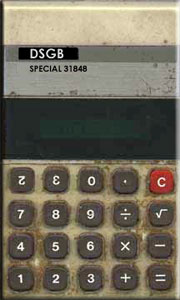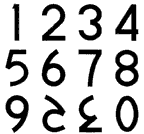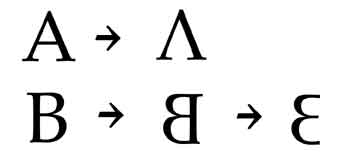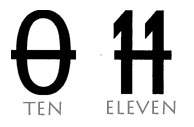



 |
 |
 |
 |
 | There have been many suggestions for the two new digits required for base twelve - not counting the A and B of the hexadecimal system - as you'll see from other articles on this site. |
To begin, here is the digit set as envisaged by Don Hammond (for some years Secretary of the DSGB). He devised this slightly different version of both extra symbols:

(See his other article in this section)
There have been many suggestions for the two symbols - and also quite a few for a completely new set of symbols. (For example, those of James Conlon, also in this section
A full set, suggested by Raymond Mason:

Here are two (suggested by Alice) - neatly adapted from the "A" and "B" used by the hexadecimalists

This is the set suggested by Louis Loynes:

Here are two from Tom Johnson:

"Dozenal Grumblings" from Noel Browning - (pdf file) has some remarks on the subject.
David James comments:
I had long thought that a dozenal base made far more
sense than decimal; I just didn't know that others thought the same
way. At any rate I had conceived of symbols for ten and eleven as well.
For ten it was a mirrored '4' through the horizontal bar of the 4. In
practice this looks sort of like a tilted 'X' with its bottom points
connected together, so it is reminiscent of the Roman ten. My symbol
for eleven is a '7' mirrored on its vertical axis. I picked seven
because of the similarity of the name (at least in English) and because
of its simplicity.
After seeing Don Hammond's designs I still prefer my
ten (the flipped 4) but I prefer his eleven (the reversed 3).
There is also the question of how to name numbers, (see other articles on this site); if "thirteen" means "three plus ten" and "forty" is "four tens", what shall we call them in base twelve?
Thirteen becomes "a dozen and one" and forty "three dozen and four"; "onezen-one" and "threezen-four"? or, though it might sound like you've got a cold, "thirdy-four"?
In addition to new symbols for the digits there are many suggestions for the naming of numbers, some adapting the ones we have, some inventing completely new sets - and not just in English! (See the section "A Rose by any other Name"...)